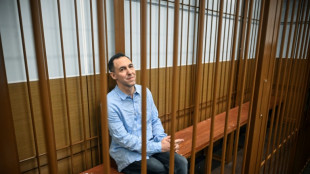
-
 Villa face Chelsea test as Premier League title race heats up
Villa face Chelsea test as Premier League title race heats up
-
Spurs extend domination of NBA-best Thunder

-
 Malaysia's Najib to face verdict in mega 1MDB graft trial
Malaysia's Najib to face verdict in mega 1MDB graft trial
-
King Charles calls for 'reconciliation' in Christmas speech

-
 Brazil's jailed ex-president Bolsonaro undergoes 'successful' surgery
Brazil's jailed ex-president Bolsonaro undergoes 'successful' surgery
-
UK tech campaigner sues Trump administration over US sanctions

-
 New Anglican leader says immigration debate dividing UK
New Anglican leader says immigration debate dividing UK
-
Russia says made 'proposal' to France over jailed researcher

-
 Bangladesh PM hopeful Rahman returns from exile ahead of polls
Bangladesh PM hopeful Rahman returns from exile ahead of polls
-
Police suspect suicide bomber behind Nigeria's deadly mosque blast

-
 AFCON organisers allowing fans in for free to fill empty stands: source
AFCON organisers allowing fans in for free to fill empty stands: source
-
Mali coach Saintfiet hits out at European clubs, FIFA over AFCON changes

-
 Last Christians gather in ruins of Turkey's quake-hit Antakya
Last Christians gather in ruins of Turkey's quake-hit Antakya
-
Pope Leo condemns 'open wounds' of war in first Christmas homily

-
 Mogadishu votes in first local elections in decades under tight security
Mogadishu votes in first local elections in decades under tight security
-
'Starting anew': Indonesians in disaster-struck Sumatra hold Christmas mass

-
 Cambodian PM's wife attends funerals of soldiers killed in Thai border clashes
Cambodian PM's wife attends funerals of soldiers killed in Thai border clashes
-
Prime minister hopeful Tarique Rahman arrives in Bangladesh: party

-
 Pacific archipelago Palau agrees to take migrants from US
Pacific archipelago Palau agrees to take migrants from US
-
Pope Leo expected to call for peace during first Christmas blessing

-
 Australia opts for all-pace attack in fourth Ashes Test
Australia opts for all-pace attack in fourth Ashes Test
-
'We hold onto one another and keep fighting,' says wife of jailed Istanbul mayor

-
 North Korea's Kim visits nuclear subs as Putin hails 'invincible' bond
North Korea's Kim visits nuclear subs as Putin hails 'invincible' bond
-
Trump takes Christmas Eve shot at 'radical left scum'

-
 3 Factors That Affect the Cost of Dentures in San Antonio, TX
3 Factors That Affect the Cost of Dentures in San Antonio, TX
-
Leo XIV celebrates first Christmas as pope

-
 Diallo and Mahrez strike at AFCON as Ivory Coast, Algeria win
Diallo and Mahrez strike at AFCON as Ivory Coast, Algeria win
-
'At your service!' Nasry Asfura becomes Honduran president-elect

-
 Trump-backed Nasry Asfura declared winner of Honduras presidency
Trump-backed Nasry Asfura declared winner of Honduras presidency
-
Diallo strikes to give AFCON holders Ivory Coast winning start

-
 Spurs captain Romero facing increased ban after Liverpool red card
Spurs captain Romero facing increased ban after Liverpool red card
-
Bolivian miners protest elimination of fuel subsidies

-
 A lack of respect? African football bows to pressure with AFCON change
A lack of respect? African football bows to pressure with AFCON change
-
Trump says comedian Colbert should be 'put to sleep'

-
 Mahrez leads Algeria to AFCON cruise against Sudan
Mahrez leads Algeria to AFCON cruise against Sudan
-
Southern California braces for devastating Christmas storm

-
 Amorim wants Man Utd players to cover 'irreplaceable' Fernandes
Amorim wants Man Utd players to cover 'irreplaceable' Fernandes
-
First Bond game in a decade hit by two-month delay

-
 Brazil's imprisoned Bolsonaro hospitalized ahead of surgery
Brazil's imprisoned Bolsonaro hospitalized ahead of surgery
-
Serbia court drops case against ex-minister over train station disaster

-
 Investors watching for Santa rally in thin pre-Christmas trade
Investors watching for Santa rally in thin pre-Christmas trade
-
David Sacks: Trump's AI power broker

-
 Delap and Estevao in line for Chelsea return against Aston Villa
Delap and Estevao in line for Chelsea return against Aston Villa
-
Why metal prices are soaring to record highs

-
 Stocks tepid in thin pre-Christmas trade
Stocks tepid in thin pre-Christmas trade
-
UN experts slam US blockade on Venezuela

-
 Bethlehem celebrates first festive Christmas since Gaza war
Bethlehem celebrates first festive Christmas since Gaza war
-
Set-piece weakness costing Liverpool dear, says Slot

-
 Two police killed in explosion in Moscow
Two police killed in explosion in Moscow
-
EU 'strongly condemns' US sanctions against five Europeans


'Blessed': US woman sees second chance in life after pig kidney transplant
Towana Looney donated a kidney to her mother in 1999 only for the remaining one to fail several years later due to pregnancy complications.
Now, the 53-year-old from Alabama has become the latest recipient of a gene-edited pig kidney -- and is currently the only living person in the world with an animal organ transplant, New York's NYU Langone hospital announced Tuesday.
"I'm overjoyed, I'm blessed to have received this gift, this second chance at life," Looney said during a press conference, held three weeks after the procedure.
Xenotransplantation, the process of transplanting organs from one species to another, has long been a tantalizing yet elusive scientific goal. Early experiments on primates faltered. But recent advances in gene editing and immune system management have brought the dream closer to reality.
Pigs have emerged as the ideal donors: they grow quickly, produce large litters and are already part of the human food supply.
Advocates hope this approach can help address the severe organ shortage in the United States, where more than 100,000 people are waiting for transplants, including over 90,000 in need of kidneys.
- A last chance -
Looney had been living with dialysis since December 2016 -- eight grueling years. High blood pressure caused by preeclampsia had taken its toll, leaving her with chronic kidney disease.
Despite receiving priority on transplant waiting lists as a living donor, her search for a compatible kidney was a frustrating dead end. Her unusually high levels of harmful antibodies made rejection almost inevitable, and as her body lost viable blood vessels to support dialysis, her health declined.
Out of options, Looney applied to join a clinical trial for pig kidney transplants, and finally underwent the seven-hour surgery on November 25.
Asked how she felt afterward, Looney's joy was infectious. "I'm full of energy, I've got an appetite... and of course, I can go to the bathroom. I haven't been going in eight years!" she laughed, adding that she was looking forward to celebrating at Disney World.
Jayme Locke, a surgeon on the transplant team, described the results with awe. "The kidney functioned essentially exactly like a kidney from a living donor," she said, adding that Looney's husband saw a rosiness in her cheeks for the first time in years.
"That is the miracle of transplantation."
- Cautious optimism -
Looney's surgery is the third time a gene-edited pig kidney has been transplanted into a human who is not brain dead.
Rick Slayman, the first recipient, died in May, two months after his procedure at Massachusetts General Hospital. The second, Lisa Pisano, initially showed signs of recovery following her surgery at NYU Langone, but the organ had to be removed after 47 days, and she passed away in July.
Looney, however, was not terminally ill before the transplant, noted Robert Montgomery, who led the surgery. He said each case offers valuable lessons, helping teams refine their techniques.
The kidney was provided by biotech company Revivicor, which breeds pigs with genetically modified kidneys less likely to be rejected by patients' immune systems.
It features 10 genetic edits to enhance compatibility with the human body -- an advance over earlier efforts that used kidneys with a single gene edit and included the pig's thymus gland to help train the host's immune system and prevent rejection.
Both methods are expected to undergo clinical trials "probably by this time next year, or even sooner," Montgomery added.
A pioneer in the field, Montgomery performed the first gene-edited pig organ transplant into a neurologically deceased patient in 2021. Looney's surgery marks his seventh human xenotransplantation.
Looney was discharged December 6 to a nearby New York City apartment. Though her high antibody levels remain a concern, doctors are monitoring her closely using wearable technology and are trying a novel drug regimen to prevent rejection.
Periodic hospital visits may still be required, but the team remains optimistic she can return home in three months.
Ch.Kahalev--AMWN

